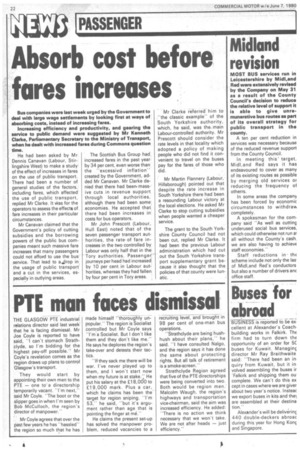Absorb cost before fares increases
Page 24

If you've noticed an error in this article please click here to report it so we can fix it.
Bus companies were last week urged by the Government to deal with large wage settlements by looking first at ways of absorbing costs, instead of increasing fares.
Increasing efficiency and productivity, and gearing the service to public demand were suggested by Mr Kenneth Clarke. Parliamentary Secretary to the Ministry of Transport, when he dealt with increased fares during Commons question time.
He had been asked by Mr Dennis Canavan (Labour, Stirlingshire West) to make a study of the effect of increases in fares on the use of public. transport. There had been a number of general studies of the factors,' including fares, which affected the use of public transport, replied Mr Clarke. It was for the operators to assess the effects of fare increases in their particular circumstances.
Mr Canavan claimed that the Government's policy of cutting subsidies and the borrowing powers of the public bus companies meant such massive fare increases that many passengers could not afford to use the bus service. That lead to a4,1rop in the usage of public transport and a cut in the services, especially in outlying areas. The Scottish Bus Group had increased fares in the past year by 34 per cent, even worse than the "excessivd inflation" created by the Government, added Mr Canavan. Mr Clarke denied that there had been massive cuts in revenue support through local authorities, although there had been some economies. He accepted that there had been increases in costs for bus operators.
Mr John Prescott (Labour, Hull East) noted that of the seven passenger transport authorities, the rateof fare increases in the two controlled by Labour was only half that in the Tory authorities. Passenger journeys per head had increased by 10 per cent in Labour authorities, whereas they had fallen by four per cent in Tory areas.
Mr Clarke referred him to "the classic exampleof the South Yorkshire authority, which, he said, was the main Labour-controlled authority. Mr Prescott should consider the rate levels in that locality which adopted a policy of making people who did not find it convenient to travel on the buses pay for the fares of those who did.
Mr Martin Flannery (Labour, Hillsborough) pointed out that despite the rate increase in South Yorksh.ire there had been a resounding Labour victory at the local elections. He asked Mr Clarke to stop cutting subsidies when people wanted a cheaper service.
The grant to the South Yorkshire County Council had not been cut, replied Mr Clarke. It had been the previous Labour administration which had cut out the South Yorkshire transport supplementary grant because it also thought that the policies of that county were lunatic.




















































































































































